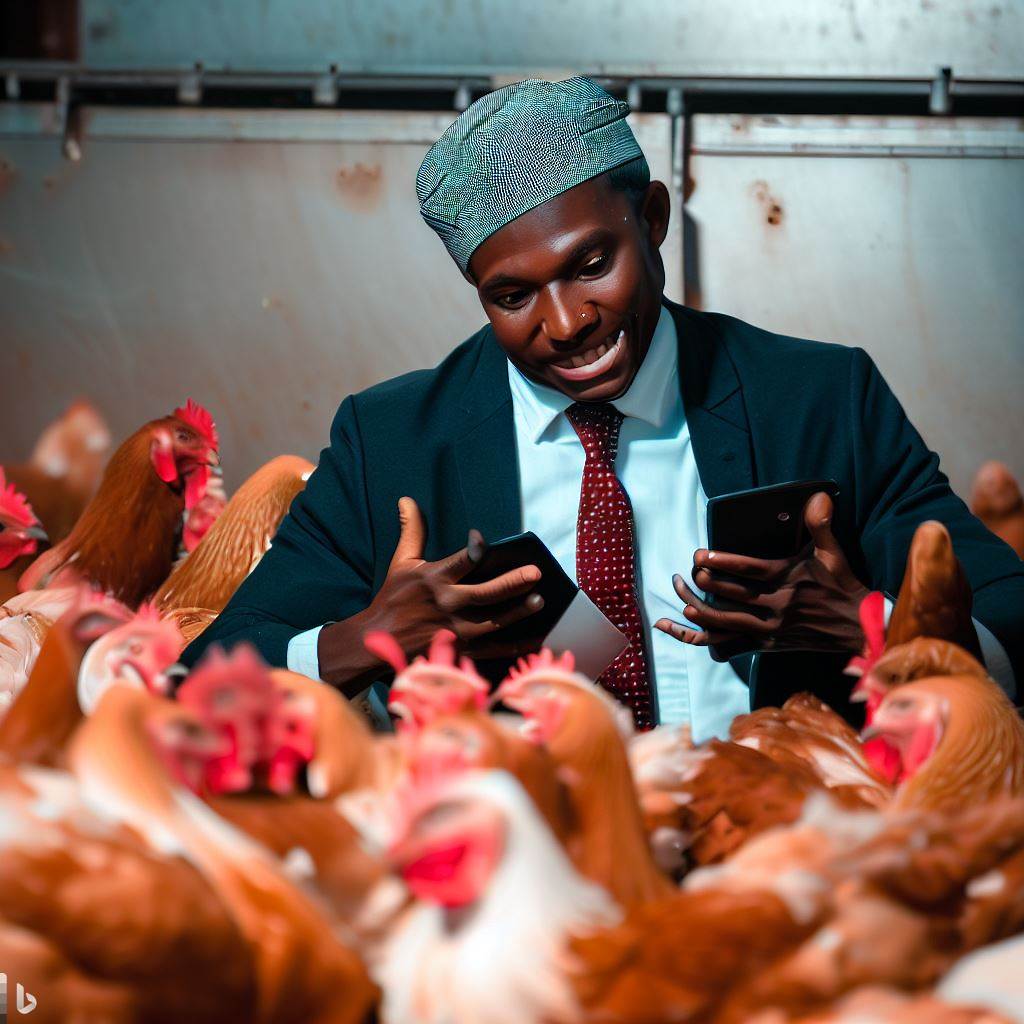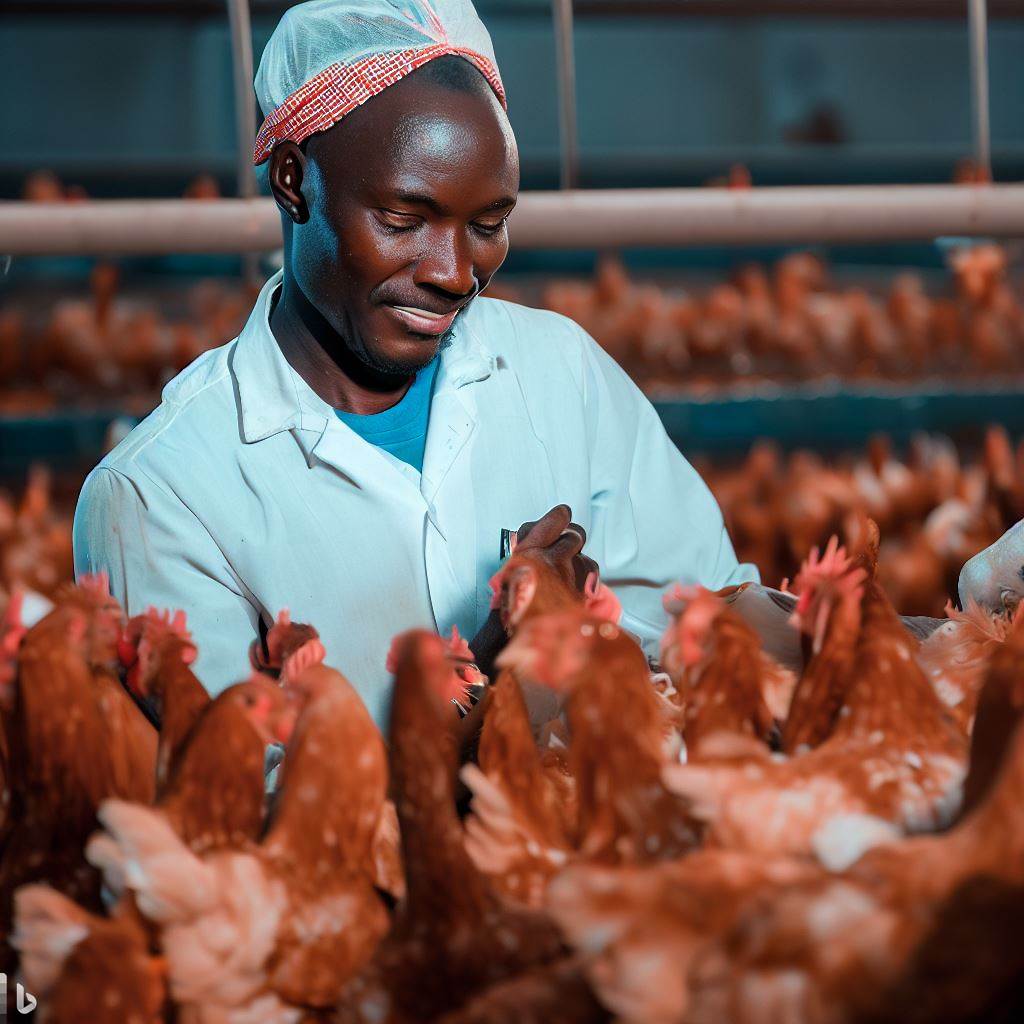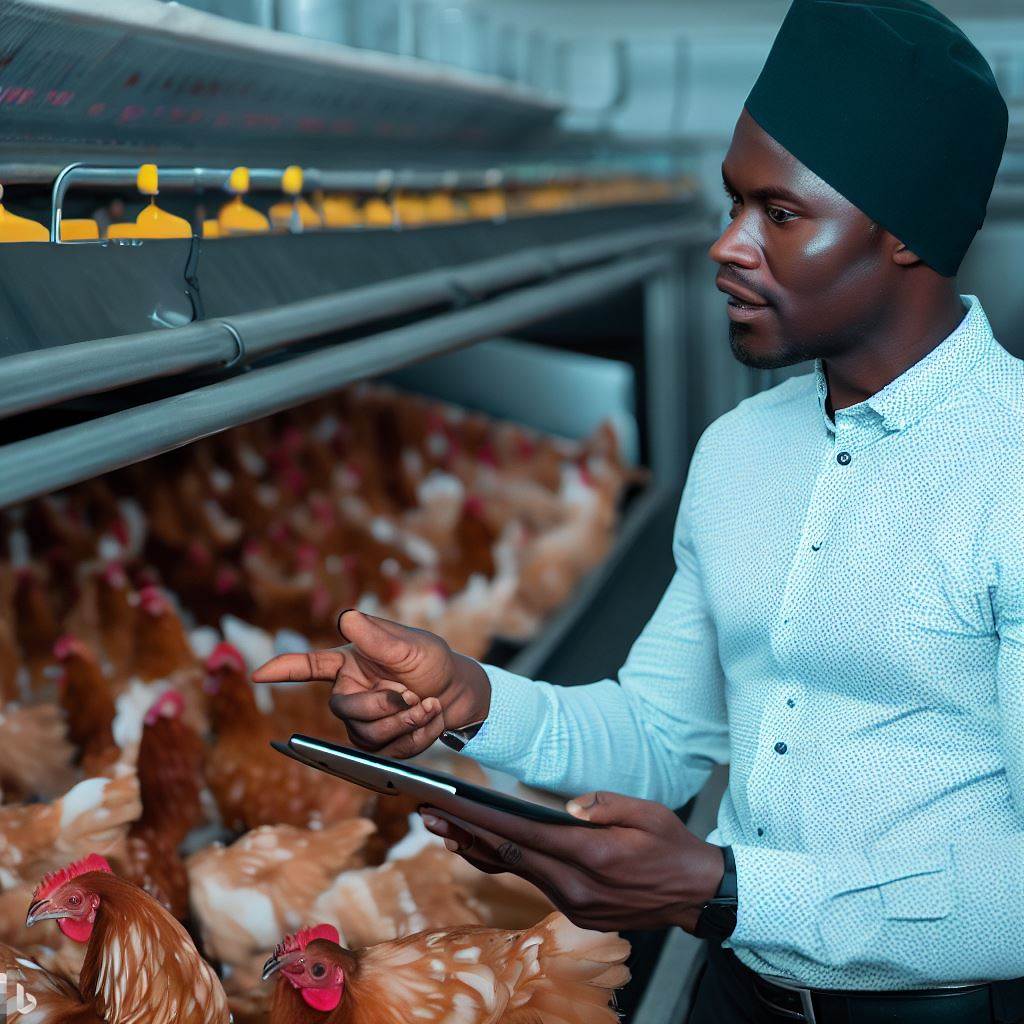Introduction
Brief overview of the Nigerian poultry industry
The Nigerian poultry industry is a vital sector that contributes to the country’s economy through job creation and food security.
Importance of poultry production in Nigeria.
Poultry production plays a crucial role in meeting the high demand for animal protein in Nigeria’s growing population.
Nigerian poultry producers face significant challenges that hinder their productivity and profitability.
Nigerian poultry producers encounter various obstacles that affect their ability to produce and earn profits.
High cost of production
In the Nigerian poultry industry, producers face several challenges that hinder their productivity and profitability.
One of these challenges is the high cost of production, which can be attributed to various factors.
Cost of feed and raw materials
- Nigerian poultry producers heavily rely on imported feed ingredients, leading to increased costs.
- Fluctuating prices of feed also contribute to the high cost of production, making it difficult for producers to plan effectively.
Energy costs
- Frequent power outages in Nigeria pose a significant challenge for poultry producers as they need constant supply for operations.
- To mitigate the impact of power outages, producers have to invest in alternative energy sources, which further raises the overall production cost.
- The high cost of diesel, predominantly used for generators during power outages, adds to the financial burden of poultry producers.
Nigerian poultry producers encounter significant challenges tied to high production expenses.
Import-dependent feed ingredients escalate costs due to shipping and handling, coupled with erratic pricing.
Energy expenses further strain finances due to recurrent power outages necessitating expensive alternative sources like diesel generators, which also raise environmental concerns.
Energy costs are already steep in Nigeria, intensifying the financial burden.
Adopting backup energy solutions, including renewables, demands substantial initial investments, deterring smaller poultry farms.
Fluctuating diesel prices, utilized for generators during outages, compound production costs. Procuring diesel and maintaining generators curtails profitability.
These issues hinder growth and profitability in the poultry sector. Solutions entail fostering local feed ingredient production, exploring renewables, and enacting stabilizing policies.
By mitigating production costs, Nigerian poultry producers can bolster competitiveness, profitability, and national food security.
Disease outbreaks and biosecurity
Disease outbreaks and lack of proper biosecurity pose significant challenges to Nigerian poultry producers.
Transform Your Career in Nigeria
Discover unmatched expertise with our personalized Career Consulting service. Navigate Nigeria’s job market with a strategy tailored just for you.
Get StartedThese issues not only affect the health and well-being of the birds but also pose a threat to the entire industry.
Prevalence of infectious diseases
1. Avian influenza
Avian influenza, commonly known as bird flu, is a highly contagious viral disease that affects poultry and can also be transmitted to humans.
Outbreaks of avian influenza have been reported in Nigeria, leading to the loss of thousands of birds and crippling the poultry industry.
The disease spreads rapidly among flocks, causing severe illness and high mortality rates.
2. Newcastle disease
Newcastle disease is another highly contagious viral disease that affects poultry, causing respiratory and neurological symptoms.
The disease spreads through direct contact with infected birds, contaminated equipment, or even through wild birds.
Outbreaks of Newcastle disease have been reported in Nigeria, resulting in significant economic losses for poultry producers.
Lack of adequate biosecurity measures
1. Insufficient knowledge and training on biosecurity practices:
Many Nigerian poultry producers lack proper knowledge and training on biosecurity practices.
This lack of understanding makes it difficult for them to prevent and control disease outbreaks effectively.
Without the necessary knowledge, producers may fail to implement adequate biosecurity measures, leading to the rapid spread of diseases within their flocks.
2. Limited resources for implementing biosecurity protocols:
Another challenge faced by Nigerian poultry producers is the lack of resources to implement biosecurity protocols effectively.
Biosecurity measures, such as creating physical barriers, maintaining proper sanitation, and monitoring flock health, require financial investment.
However, many small-scale poultry producers in Nigeria face resource limitations and are unable to afford these necessary measures.
As a result, disease control becomes a significant challenge.
Your Unique Story, Perfectly Told
Don't let your dream job slip away with a generic resume. We craft personalized resumes and cover letters that highlight your unique strengths, making you unforgettable to Nigerian employers.
Get HiredIn fact, disease outbreaks, especially avian influenza and Newcastle disease, pose significant challenges to Nigerian poultry producers.
Additionally, the lack of adequate knowledge and resources for implementing biosecurity measures further exacerbates the situation.
It is crucial for the government and relevant organizations to provide training and support to poultry producers in order to mitigate the impact of infectious diseases and improve biosecurity practices in the industry.
Read: Traits for Success in Agronomy Sales Management
Poor infrastructure and limited technology adoption
Nigerian poultry producers face numerous challenges that hinder their growth and profitability.
One significant obstacle is the poor infrastructure and limited technology adoption within the industry.
Inadequate transportation and storage facilities
The first subchallenge is the inadequacy of transportation and storage facilities.
Poultry products need efficient and reliable means of transportation to reach markets in a timely manner.
However, Nigerian poultry producers face difficulties in transporting their products due to the lack of well-maintained roads and transportation infrastructure.
Furthermore, the absence of proper cold storage facilities poses a significant challenge for poultry producers.
Inconsistent access to reliable cold storage prevents them from preserving and maintaining the quality of their products.
This often leads to spoilage, resulting in substantial financial losses.
Limited use of technology in production
In addition to poor infrastructure, Nigerian poultry producers struggle with limited technology adoption in their production processes.
With the advancement of technology in the global poultry industry, the low utilization of automated systems for feeding and monitoring puts Nigerian producers at a disadvantage.
Transform Your LinkedIn Presence
Don't let your LinkedIn profile blend into the crowd. We uniquely craft profiles that showcase your professional story, making Nigerian recruiters take notice like never before.
Stand OutThe absence of advanced feeding and monitoring systems slows down the overall production cycle and results in inefficient resource utilization.
It also increases the risk of inaccurate data collection, leading to suboptimal decision-making processes.
Furthermore, Nigerian poultry producers lack sufficient access to advanced breeding techniques.
Breeding plays a crucial role in improving the genetic potential of poultry stocks, enhancing productivity, and developing disease-resistant breeds.
However, the limited adoption of advanced breeding techniques hinders the overall progress of the industry.
To overcome these challenges, the Nigerian poultry industry must invest in improving infrastructure, particularly in transportation and storage facilities.
The government should prioritize the development and maintenance of proper road networks and cold storage facilities to ensure the efficient and safe transportation of poultry products.
Additionally, there should be a focus on promoting technology adoption among poultry producers.
Training programs and financial incentives can encourage the utilization of automated systems for feeding and monitoring.
The government and relevant stakeholders should also provide support and subsidies to ensure poultry producers have access to advanced breeding techniques and knowledge.
Addressing these challenges will not only enhance the competitiveness of Nigerian poultry producers but also contribute to the overall growth and development of the country’s agricultural sector.
By improving infrastructure and embracing technology, Nigerian poultry producers can overcome these obstacles and thrive in an increasingly competitive global market.
Read: The Impact of Agronomy Sales in Nigeria’s Economy

Inconsistent government policies and regulations
Lack of support and incentives for poultry producers
- Insufficient access to credit and loans
- Inconsistent government subsidies
Nigerian poultry producers face numerous challenges that hinder their productivity and profitability.
One major obstacle they encounter is the inconsistency in government policies and regulations.
Insufficient access to credit and loans:
Poultry producers in Nigeria struggle to secure adequate financing for their operations.
Limited access to credit and loans makes it difficult for them to invest in modern technologies and expand their businesses.
Without the necessary funds, producers find it challenging to overcome financial constraints and improve their productivity.
Inconsistent government subsidies:
The government provides subsidies to support the poultry industry, but the disbursement of these subsidies lacks consistency.
Producers often face delays and uncertainty in receiving the subsidies. This inconsistency hampers their ability to plan and make decisions that align with the government’s intended support.
Inadequate regulation and enforcement
- Challenges in monitoring and controlling poultry imports
- Weak enforcement of quality and safety standards
The poultry industry in Nigeria also grapples with inadequate regulation and enforcement, which further aggravates the challenges faced by producers.
Challenges in monitoring and controlling poultry imports
Nigeria has experienced a surge in poultry imports, often smuggled through illegal channels.
Inadequate monitoring and control measures make it difficult to identify and curb these illegal imports.
This influx of cheaper imported poultry products creates unfair competition for local producers, impacting their profitability.
Weak enforcement of quality and safety standards:
While quality and safety standards exist, their enforcement remains weak.
This lack of effective enforcement allows for the production and sale of substandard poultry products in the market.
Consumers may be exposed to health risks, and the reputation of Nigerian poultry products suffers as a result.
In short, Nigerian poultry producers face significant challenges due to inconsistent government policies and inadequate regulation.
The lack of support, insufficient access to credit, inconsistent subsidies, and weak enforcement of quality and safety standards hinder the growth and profitability of the industry.
To alleviate these challenges, it is crucial for the government to prioritize the implementation of consistent policies, provide better support and incentives, and strengthen regulation and enforcement mechanisms.
Read: Promoting Gender Equality in Nigeria’s Livestock Sector
Market challenges and competition
Unfair competition from imported poultry products
- Influx of cheap imported poultry products.
- Disruptive impact on the local poultry market.
Limited access to markets and distribution networks
- Difficulties in reaching consumers efficiently.
- Lack of infrastructure for effective distribution.
Nigerian poultry producers encounter daunting market challenges, chiefly due to unjust competition from imported poultry items.
The surge in inexpensive foreign products disrupts the local poultry market, rendering fair pricing and competition difficult.
This deluge of imports makes it strenuous for local producers to secure a market foothold.
Furthermore, the influx of cost-effective imports threatens local poultry producers’ sustenance.
As cheaper alternatives attract consumers, local demand dwindles, exacerbating existing predicaments.
Restricted access to markets and distribution networks adds another layer of complexity.
Many producers lack the means to effectively market and distribute their offerings.
Infrastructure inadequacies exacerbate these issues. Subpar transportation, storage, and cold chain facilities hinder prompt and proper product delivery.
These hurdles hamper both profitability and industry expansion. To surmount these obstacles, government backing and infrastructure investment are vital.
Addressing unfair competition through policy reform and incentivizing local production is crucial.
Enhanced infrastructure will enable efficient distribution, nurturing industry growth.
In essence, Nigerian poultry producers face multifaceted challenges—unfair competition, constrained market access, and inadequate infrastructure.
A comprehensive approach involving policy reform and infrastructure investment is key to their prosperity and the industry’s advancement.
Read: The Journey to Becoming a Poultry Producer in Nigeria
Conclusion
Recap of the challenges faced by Nigerian poultry producers
Throughout this blog post, we have discussed the top challenges faced by Nigerian poultry producers.
These challenges include high feed costs, disease outbreaks, lack of access to credit, poor infrastructure, and inadequate government support.
Call for government support and intervention
It is crucial for the Nigerian government to step in and provide support and intervention to the poultry industry.
This can be done through the implementation of policies that lower feed costs, improve disease control measures, and enhance access to credit for poultry farmers.
Importance of addressing these challenges for the growth and sustainability of the Nigerian poultry industry
Addressing these challenges is vital for the growth and sustainability of the Nigerian poultry industry.
With government support and intervention, poultry producers can overcome the barriers they face and maximize their production potential.
This will contribute to the overall development of the agricultural sector and boost the economy.
In summary, Nigerian poultry producers face numerous challenges that hinder their growth and productivity.
However, with the necessary government support and intervention, these challenges can be overcome, paving the way for a thriving and sustainable Nigerian poultry industry.




